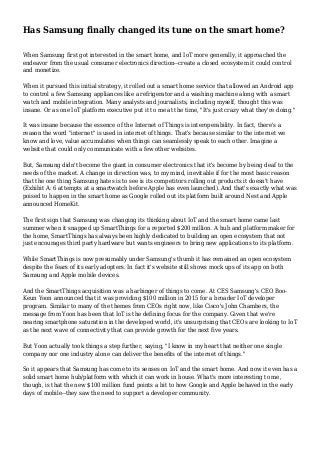
Has Samsung finally changed its tune on the smart home?
- 1. Has Samsung finally changed its tune on the smart home? When Samsung first got interested in the smart home, and IoT more generally, it approached the endeavor from the usual consumer electronics direction--create a closed ecosystem it could control and monetize. When it pursued this initial strategy, it rolled out a smart home service that allowed an Android app to control a few Samsung appliances like a refrigerator and a washing machine along with a smart watch and mobile integration. Many analysts and journalists, including myself, thought this was insane. Or as one IoT platform executive put it to me at the time, "It's just crazy what they're doing." It was insane because the essence of the Internet of Things is interoperability. In fact, there's a reason the word "internet" is used in internet of things. That's because similar to the internet we know and love, value accumulates when things can seamlessly speak to each other. Imagine a website that could only communicate with a few other websites. But, Samsung didn't become the giant in consumer electronics that it's become by being deaf to the needs of the market. A change in direction was, to my mind, inevitable if for the most basic reason that the one thing Samsung hates is to see is its competitors rolling out products it doesn't have (Exhibit A: 6 attempts at a smartwatch before Apple has even launched). And that's exactly what was poised to happen in the smart home as Google rolled out its platform built around Nest and Apple announced HomeKit. The first sign that Samsung was changing its thinking about IoT and the smart home came last summer when it snapped up SmartThings for a reported $200 million. A hub and platform maker for the home, SmartThings has always been highly dedicated to building an open ecosystem that not just encourages third party hardware but wants engineers to bring new applications to its platform. While SmartThings is now presumably under Samsung's thumb it has remained an open ecosystem despite the fears of its early adopters. In fact it's website still shows mock ups of its app on both Samsung and Apple mobile devices. And the SmartThings acquisition was a harbinger of things to come. At CES Samsung's CEO Boo- Keun Yoon announced that it was providing $100 million in 2015 for a broader IoT developer program. Similar to many of the themes from CEOs right now, like Cisco's John Chambers, the message from Yoon has been that IoT is the defining focus for the company. Given that we're nearing smartphone saturation in the developed world, it's unsurprising that CEOs are looking to IoT as the next wave of connectivity that can provide growth for the next five years. But Yoon actually took things a step further, saying, "I know in my heart that neither one single company nor one industry alone can deliver the benefits of the internet of things." So it appears that Samsung has come to its senses on IoT and the smart home. And now it even has a solid smart home hub/platform with which it can work in house. What's more interesting to me, though, is that the new $100 million fund points a bit to how Google and Apple behaved in the early days of mobile--they saw the need to support a developer community.
- 2. But Samsung differs from Google and Apple in that while its software development leaves a lot to be desired, it has a breadth of in house hardware it can test. From 3D sensors to smart phones to fridges to semiconductors, it actually has enormous expertise in hardware development that it could use to begin modeling a really well designed and interoperable hardware ecosystem. Will it really execute on such an IoT vision? It's unclear but so far it's relationship to SmartThings and the new $100 million fund suggests that it's not treating its investments as simply means to stake out a position in a market but also to develop and improve its own understanding and products. And it'll be that kind of culture, coupled with good, interoperable hardware and software design, that it'll need to go up against Apple and Google. http://research.gigaom.com/2015/03/has-samsung-finally-changed-its-tune-on-the-smart-home/